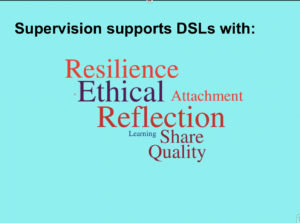Supervision now: emotional support and self-care for school staff during ordinary and extraordinary times
May 27, 2020 @ 12:20 pm
This blog is co-written with Jo Rowe. We are keen to promote supervision in schools and why we think it is such an important time now for schools to have supervision available for them.
What have we observed happening in education during a pandemic? It is our belief that schools have risen to the challenge of working with and supporting the children and young people in their care, as well as their families. Jo has been working with schools that are teaching the children of keyworkers, children with Education and Health Care Plans, children with a range of additional needs including those on the autistic spectrum and with anxiety, and those most vulnerable children in their communities. We know schools that are telephoning children and young people, and parents and carers on a weekly and sometimes daily basis. We know schools that have developed their IT to reach out to, teach and support children using Microsoft Teams, Zoom, Google classroom, and who are setting weekly challenges on their school websites or Facebook pages for children and parents to enjoy together. We’ve seen some great YouTube videos. We know schools that are setting and marking work online to keep children learning, particularly those who need the structure and routine. We know schools that are sewing masks and scrubs for Health Care professionals. We know schools that are making and delivering meals to ensure that vulnerable children in society are having at least one meal a day.
Whatever your role, school staff are helping the children, young people and their parents and carers in their local communities. Schools have always been, and continue to be, an important focus of support in their local communities.
The COVID 19 pandemic is global and has affected everybody living in the UK. Everyone has been locked down, and yet for each person that has produced a unique experience. Some children will have lived in families shielding someone at high risk of dying should they catch the virus, others will have witnessed exhausted, stressed and anxious parents trying to work (or worrying about not having work /income) and home schooling and others will have been bereaved. There will be a huge range of variables. The universality of the pandemic will produce shared challenges – what does ‘school’ mean now? How will social connections be made at a safe distance by managing to keep everyone apart? How will those social connections ensure the emotional responsiveness children and young people require with adults and their peers to learn and develop. How will the underlying anxiety about the uncertainty of who is at risk, how will the virus be managed and what impact will it have, be managed in such a way children feel safe enough to learn?
As schools prepare for more children and young people to return to their educational settings, whenever this may be, they will now face these new challenges. Schools will be considering the health and safety of their students, staff and their families. They may be considering whether they need to have PPE (personal protection equipment). They will be thinking about creative ways to ensure safe physical distance whilst maintaining social contact. They will be thinking about how to transition children back into their school settings and meeting their emotional and mental health needs whilst developing their social interaction and communication skills while maintaining a safe distance and possibly wearing a mask. There may be increased anxiety from students, staff and their families. And, there may be experience of bereavement for the children and young people, their families, school staff members and colleagues. How can school staff manage all these challenges and maintain their own well-being?
If people are exposed to high levels of anxiety and traumatic events without the opportunities to process and make sense of their experiences we know there is a risk of secondary trauma (sometimes known as vicarious trauma or burn out). Staff may become unwell or react unexpectedly. For some people they fear that catching COVID-19 may be life threatening and living with this anxiety could severely inhibit their usual functioning.
There are many ideas to support emotional and mental health needs in your personal life. Our particular favourites are: daily exercise in the form of a walk, being kind to others, a gratitude practice and being mindful. However, the focus of this blog is to consider what support you can receive in your professional life. Our collaboration began around understanding the benefits of supervision for ourselves in our individual careers as an Educational Psychologist and a Social Worker and noticing its significant omission in education.
Supervision that we have received, and offer to others, formalises an expectation of being supported to do the best job we are capable of. It facilitates discussion about anything that worries us, to draw on other’s experiences, knowledge and skills to brainstorm ideas. It allows us to ask for help when we need it. Supervision provides emotional support in an emotionally demanding and exhausting job. Supervision is a professional conversation. It is a method of offering managerial input, emotional support and enhancing professional development to staff. We have long advocated supervision in schools for those involved in safeguarding and promoting pastoral care of students. In these extraordinary and unprecedented times, never has supervision been needed more in our schools.
As schools move into the next phase they will encounter responses to the pandemic and reconnecting after lockdown that belong to the whole school, there will be individual needs expressed by staff and students and for some their ability to reconnect with school and learning will need specialist attention. The staff team will require creative, compassionate spaces to explore and process these experiences and find solutions that work. It is our belief that supervision could be that space.
If you want to find out more please click here
Alternatively contact me through the website.



